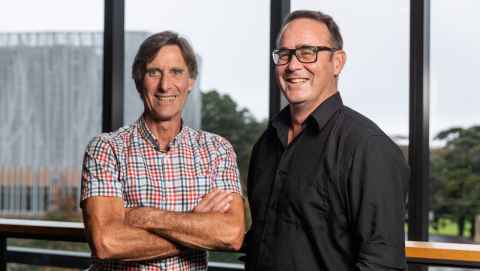Can gut bugs influence anorexia?
18 December 2024
Gut bugs research at the Liggins Institute is making ground.

The gut microbiome is home to billions of bacteria that help humans digest food and absorb nutrients. In the last two decades, research has found that these bacteria can also influence mood, appetite, immunity and inflammation. Since 2017, Professor Wayne Cutfield and Professor Justin O’Sullivan of the Liggins Institute have been investigating the potential of ‘gut bugs’ to address conditions including autism and obesity. Supported by the Rockfield Trust, their latest research explores the connection between gut health and anorexia nervosa.
The idea was sparked by the discovery of a study that trialled the gut microbiome transfer (GMT) of an anorexic human to a germ-free mouse. The mouse began eating less, losing weight and developing anxious behaviour characteristic of anorexia, indicating that the new gut bacteria was responsible. Further studies exploring GMT in human subjects with medical conditions including diabetes, heart disease and eczema revealed a common finding: all participants had a disordered gut microbiome. This got Wayne and Justin thinking: “What role does the gut microbiome play in anorexia in humans? More importantly, if you put the microbiome of a healthy donor inside someone with anorexia, could that help their symptoms?”
Wayne is quick to point out that GMT is not a cure for medical conditions. What he and Justin hoped to determine was whether it could alleviate some of the components of anorexia and establish if GMT was a viable option for patients.
“There had never been a GMT trial in anorexia before. We first wanted to know: would this be an acceptable treatment? And second, was it safe for people with anorexia?”
The gut bugs team worked hard to develop a tolerable technique for GMT, which historically involved one of two unpleasant, invasive procedures. They collected stool from healthy donors, cleaned the bacteria and enclosed it within two capsules “kind of like handmade chocolates,” Wayne says. Despite the capsules’ filling, they are tasteless and odourless and can be swallowed like a regular pill.
The pilot study focused solely on young women, a group who is disproportionately affected by anorexia nervosa. All 15 participants took a full course of 20 capsules over two days. The capsules were well-tolerated, and participants could not distinguish placebo pills from those containing the microbiome. These findings confirmed Wayne and Justin’s hypothesis that GMT is both an acceptable and safe treatment for anorexia, paving the way for larger-scale studies to take place.
The trial also reinforced a major discovery from the team’s previous gut bugs research: the ability for healthy donor microbiomes to become engrafted in their new hosts.
“After one treatment, the newly introduced bacteria are established,” Justin says. “They set up their own community and thrive – and we know from our obesity study that they continue to thrive years later.”
This finding highlights GMT’s potential to deliver long-term benefits with only minimal patient input required. “One single treatment can have a very long-lasting effect. This isn't something you need to take every day, week or month.”
The Edney family’s support through the Rockfield Trust has been critical in enabling Wayne and Justin to carry out their gut bugs studies. The family has been actively engaged from the first trial, allowing them to begin work quickly, says Wayne. It also gave them the chance to conduct a trial without concrete evidence of the anticipated outcome.
“We wouldn't have got anywhere without them, because this is innovative research. Philanthropic funding is so helpful when you're doing something cutting-edge without the pilot data that standard funding requires. It’s high-risk, high reward. But somebody's got to start – and why can't Kiwis be first out of the starting blocks?”
They are now working hard to mitigate a key barrier to expanding GMT treatment: reliance on human donors. The current system involves a rigorous screening process which is labour-intensive and costly, as only eight percent of potential donors meet the requirements. The team is developing ways of identifying, isolating and culturing superior gut bacteria and have already had early success. They are hopeful that lab-grown gut bugs will form the basis of future GMT treatments, broadening reach and impact across Aotearoa New Zealand and the world.
Media Contact
Helen Borne | Communications and Marketing Manager
Alumni Relations and Development
Email: h.borne@auckland.ac.nz